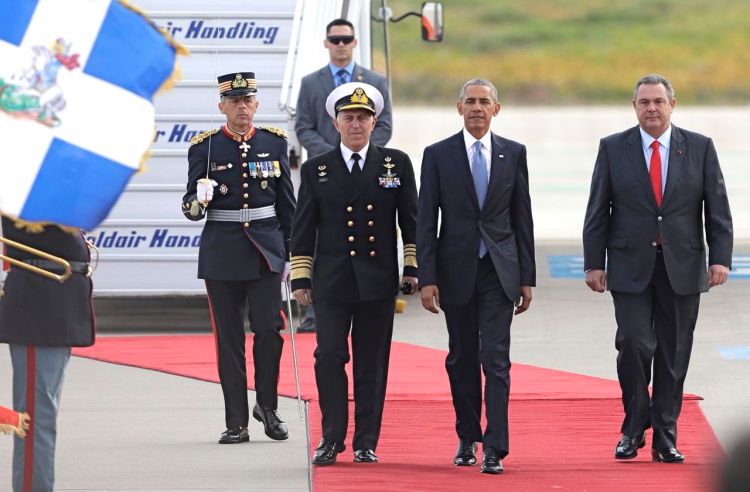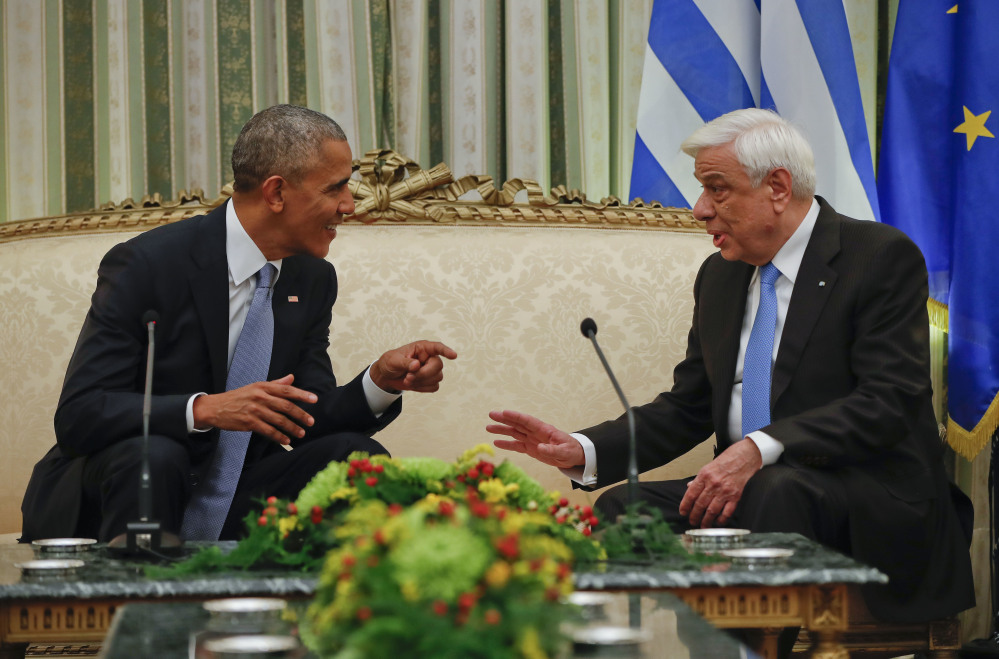ATHENS, Greece – President Barack Obama opened his final foreign trip as president Tuesday with reassuring words in Greece about the U.S. commitment to NATO even as he prepares to hand off to a Donald Trump administration, saying Democratic and Republican administrations alike recognize the importance of the alliance to the trans-Atlantic relationship.
Without mentioning Trump by name, Obama told Greek President Prokopis Pavlopoulos that a strong NATO is of “utmost importance” and would provide “significant continuity even as we see a transition in government in the United States.”
Pavlopoulos, for his part, thanked Obama for U.S. support of the Greek people in a time of social and economic crisis, and said he was confident that Trump “will continue on the same path.”
Trump’s election has generated significant unease in Europe because of his tough talk during the campaign suggesting the U.S. might pull out of the NATO alliance if other countries don’t pay more.
Obama’s reassurances reflect an attempt to ease the deep concerns about Trump and the future of America’s treaty alliances. Yet they may be greeted with skepticism: For months throughout the campaign, Obama repeatedly assured world leaders in public and private that Trump would not be elected, only to see him emerge victorious from last week’s election.
Obama also met Tuesday with Greek Prime Minister Alexis Tsipras, and offered a welcome message of support for the Greeks as they struggle with both economic woes and a huge influx of refugees. Obama pledged to keep pressing his view that “austerity alone cannot deliver prosperity and that it is going to be important both with respect to debt relief and other accommodative strategies to help the Greek people in this period of adjustment.”
Obama and Tsipras were to hold a joint news conference later in the day, and Pavlopoulos was hosting an official dinner for Obama at the presidential mansion in the evening.
Obama is making the first visit to Greece by a sitting U.S. president since Bill Clinton in 1999. Security was tight, with major roads shut down along Obama’s motorcade route and a ban on public gatherings and demonstrations in swaths of central Athens and a southern suburb near a seaside luxury hotel where Obama was staying. Boats were also banned from sailing near the coastline at the hotel’s location.
More than 5,000 police were deployed in the capital’s streets for the two-day visit. Left-wing and anarchist groups have planned protest demonstrations for Tuesday afternoon, while an armed anarchist group has called for “attacks and clashes” to disrupt Obama’s visit. Clinton’s visit, which came during the height of U.S. intervention in the wars ensuing from the breakup of Yugoslavia, was marked with extensive violent demonstrations.
On Wednesday, Obama is scheduled to tour the Acropolis and give a major speech about democracy and globalization before flying on to Berlin. From Germany, Obama will travel to Peru for an Asian economic summit before returning to Washington on Saturday.
Obama said he was looking forward to visiting the Acropolis because “if you come to Greece you’ve got to do a little bit of sightseeing.”
Greece’s government has hailed Obama’s visit as being of “huge importance” for both Greece and Europe. The country’s left-led coalition government has been struggling to pull Greece out of six years of a vicious financial crisis that has devastated its economy and left more than a quarter of the workforce unemployed. Despite the U.S. election, the government has pinned its hopes on the U.S. president to help persuade some of the country’s more reluctant international creditors, such as Germany, to grant it significant debt relief.
Without a cut in its debt, Athens says, it cannot hope to recover economically – an argument also supported by the International Monetary Fund.
Greece has been relying on emergency loans from three consecutive multi-billion euro bailouts from other European Union countries using the euro currency, and the IMF, since 2010. While the United States has not been involved in Greece’s bailout, Athens has long seen it as an ally that could apply pressure on creditors.
The U.S. has praised Greek efforts to overhaul its economy but has repeatedly stressed the country must continue with painful reforms. The country’s bailout funds are disbursed following reviews by international debt inspectors of mandated reforms.
The government will also be looking for recognition of the country’s role in Europe’s refugee crisis, which saw hundreds of thousands of refugees pass through Greece from Turkey on their way to the more prosperous countries of the European north, and for U.S. pressure on the rest of Europe to help shoulder the burden. Following the closure of Balkan land borders and the reluctance of some European countries to host refugees, more than 60,000 people are stranded in Greece, most living in often poor conditions in overcrowded camps dotted around the country.
Rights organizations have urged Obama to use his visit to highlight these people’s plight and Europe’s response to the crisis.
Obama should “shine the spotlight not only on abysmal conditions for the tens of thousands of refugees stranded in Greece, but also on the failure of world leaders to adequately address the wider global refugee crisis,” John Dalhuisen, Amnesty International’s Europe director, said in a statement.
Follow Josh Lederman on Twitter at http://twitter.com/joshledermanAP and Elena Becatoros on https://twitter.com/ElenaBec
Send questions/comments to the editors.



